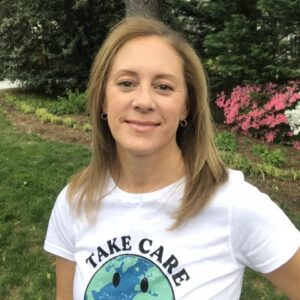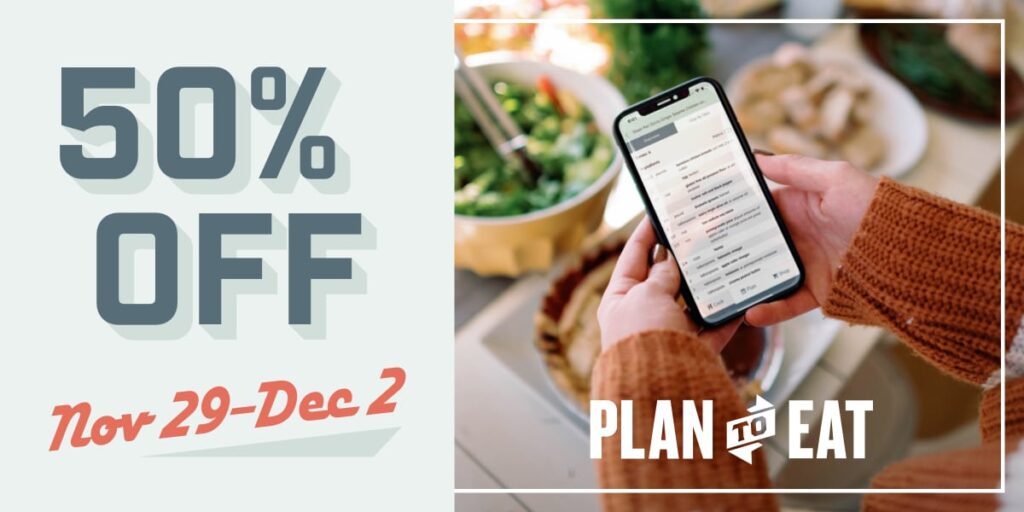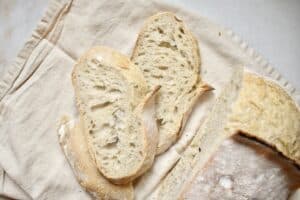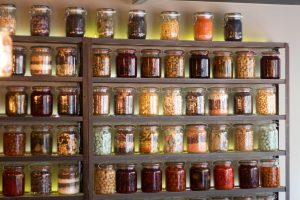In March, I was honored to be interviewed by Authority Magazine for a series about reducing food waste. One of the key points we touched on was the way meal planning helps individuals and families reduce their food waste, which also impacts their budget and anxiety around food. I’ve seen the positive impact of meal planning on my own household food waste, but I wanted to talk to a “green” expert and hear what she had to say about the connection between planning and food waste.
Today, I have an interview with Pam Mercer to discuss tactics for reducing food waste at home.
Pam Mercer is the founder of Greenily – Your Family Only Greener. Her background is in conservation education and now she helps moms adopt simple lifestyle changes to be more eco-friendly. You can connect with her through Instagram, where she shares a lot of “green” tips and through her podcast, Green Wife, Happy Life that she hosts with her “not-so-green” husband.

Q: What happened to make you passionate about reducing household waste?
I spent 10 years working at the National Zoo in Washington, DC in conservation education where I learned a lot about the threats to wildlife and the environment in faraway places like Namibia and China. When I left to become a stay-at-home mom after having my third child, I shifted my focus to what we could do at home as a family to help protect the planet.
Q: What were the first steps you took to start reducing waste?
My first step, which is what I think a lot of people start with, was trying to recycle as much as possible. That meant setting up recycling bins in the kitchen that I labeled with pictures of what went in each bin instead of words because my kids were so little they didn’t even read yet! I think the pictures helped my husband too! 🙂
Q: What about reducing food waste?
My first steps to reduce food waste were to give home composting a try. TBH, with three kids under 4, I was a little underwater and had a hard time keeping it up. I learned about a relatively new local company at the time called The Compost Crew that offered a compost pick-up service and we’ve been using them since. And because they are an industrial compost site we are able to compost much more food waste than we could in our home compost bin.
Q: What do you think is the biggest contributor to household food waste?
For me, the biggest contributor to household food waste is a lack of planning and prep, especially when it comes to fresh food. And, chatting with friends, we are all guilty of running through the grocery store without a plan or a list, getting home only to find out that we didn’t need much of the produce we bought. Or that we were too busy to properly store it so it lasted long enough to get used.
Q: Can you tell me how you use Plan to Eat to meal plan and waste less food?
I use Plan to Eat to loosely plan out weekly meals which in turn automatically creates a shopping list for me! I also use the Staples List feature to easily add the things we always buy and use to quickly add them to my shopping list. When I stick to weekly planning I buy what we need and use what we buy. It makes a HUGE difference in the amount of food waste we have.
Q: What features do you find particularly helpful in reducing food waste?
I love scrolling Instagram for recipe ideas so I LOVE that I can import recipes into Plan to Eat using a URL. It is SO helpful and saves a ton of time. That feature is a close second to my favorite feature which is the auto shopping list created from my meal plan!
Q: Are there any myths about food waste you can debunk for us?
I, like probably many others, used to think that it wasn’t an issue for food to go into the trash and end up in the landfill. It was food, it would just break down, right? It wasn’t until I understood how a landfill actually worked and that the conditions just weren’t there for food to break down quickly that I saw the importance of reducing food waste and removing it from the landfill stream completely with composting.
Q: What’s one simple thing any family can do to reduce household food waste?
The biggest impact I’ve seen on our family’s food waste really comes down to making a plan for what we need and what we’ll use. It’s not perfect every week and sometimes we stray from our plan but the better the plan, the easier it is to buy what we need and use what we buy. So, in short, having some sort of plan for what food is needed is simple but can make a big difference.
Q: Do you have anything fun planned for Earth Day?
I’m hoping to be able to spend some time outdoors, enjoying nature and hiking with our two chocolate labs!
I hope you enjoyed this short interview! Pam will be joining me on the Plan to Eat Podcast this summer to talk more about food waste and eco-friendly living. Stay tuned for that episode!






